#a history. vaguely
Explore tagged Tumblr posts
Text
Is she a "forgotten woman of history" or is this just the first time you've personally heard about her?
3K notes
·
View notes
Text
i'm actually very okay with "there was no other way this could end" endings. if they gotta die, let them die. if they gotta break up or go the wrong way or lose something important, let'em. so long as it completes the story. only thing i dislike more than a forced happy ending is a forced bad ending
#writing#storytelling#film#dnly rants#og#goncharov#gonchposting#writing tips#vaguing marvel on main#history
18K notes
·
View notes
Text
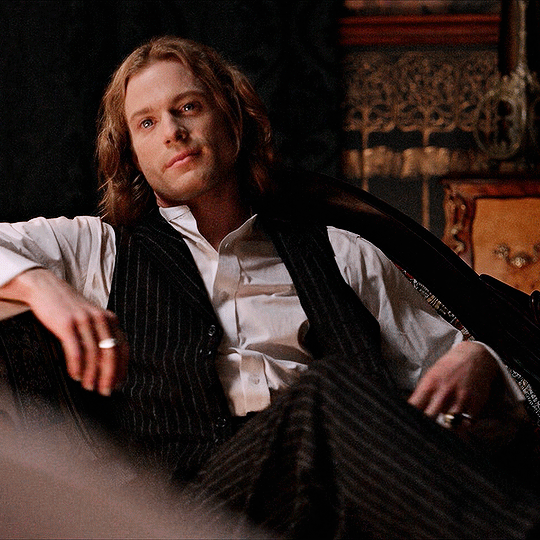
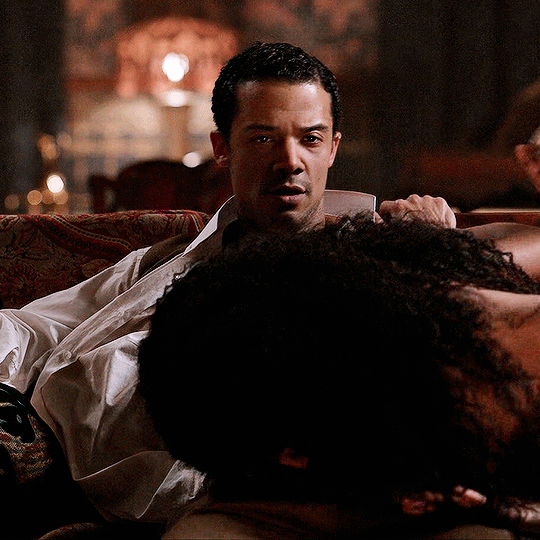
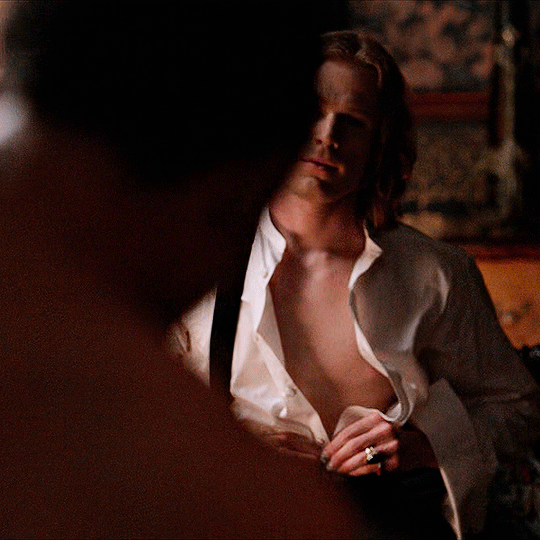

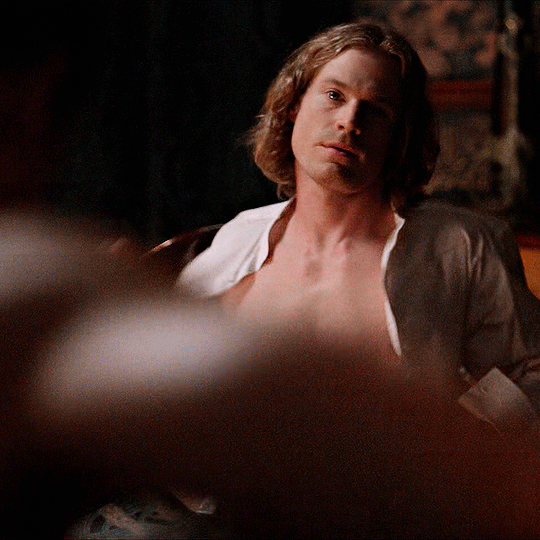
Even the planets and stars are blindfolded.
#iwtvedit#not sure this level of eyefucking has ever been registered in history before#also sam reid you are insane for that (gestures vaguely)#lestat de lioncourt#sam reid#louis de pointe du lac#jacob anderson#loustat#iwtv#amc iwtv#interview with the vampire#iwtv gifs#amc interview with the vampire#the vampire chronicles#tuserlivia
2K notes
·
View notes
Text
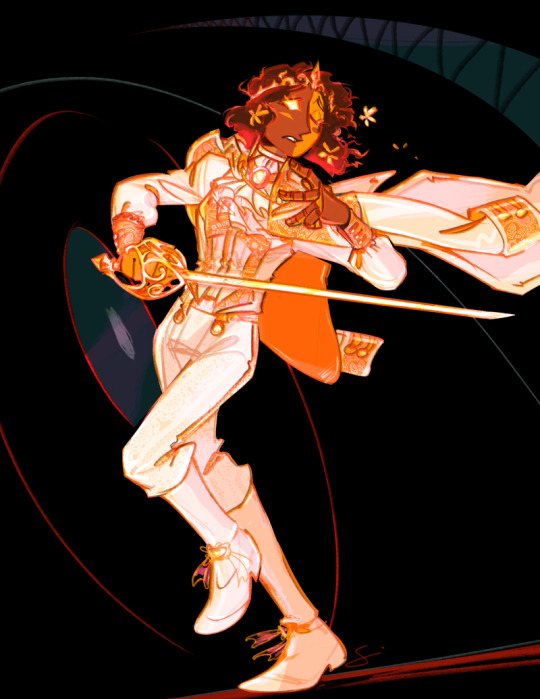
He's always helping everybody else to find their happily ever after... but who will save prince charming?
(actually my 2nd entry for the fashion zine heee)
#great god grove#thespius green#thespius fashion zine#give that man the gayest sword in history he deserves it#mod art#I think a lot about how you can keep going back to thespius#to ask for hints for any part of the hobbyhoo arc#like clicky is much more vague esp bc he wrote it all... but thespius says new things all the time for things that are easy to solve#almost as if they knew people would just... want to go back and talk to him a lot...
1K notes
·
View notes
Text
"The male-male relationships that these 18th-century men desired did not use passionate heterosexual love as their model or language, but instead a masculine relationship of friendship, in which sexual desire was included." - Michel Rey, 1700-1750, Les sodomites créent une mode de vie
FUCKING THANK YOU.
#the amount of people who cannot get this...#so much of the. stupid discourse around “why are we calling them friends” ignores that there is. a massive fucking grey area#between 'friend' (modern conception) and 'romantic'#and we are attempting to divide into two strict black and white categories what the 18thC saw as more vague and overlapping#and what IS more vague and overlapping lmao. 18thC was smarter there.#queer history
290 notes
·
View notes
Text
I love libraries.
I'm browsing the WWI shelves (as you do) and notice a very old book about the war. I glance at the first pages that talk about how one day the war will be over and we'll look at this place and not see any signs of the battlefield.
Then it hits me. And I check the publishing date.
This book was printed before the war's end. Not written. Printed. The physical object was created in 1918, while the war in question was raging and the end was as yet uncertain.
Now I'm standing on the other side of the apocalypse, with this physical link to that era in my hands. I'm living proof that the war did end and life did go on and we can all look at the end of the world as a long-ago memory.
Reading old books is cool enough, connecting our minds and hearts through the ideas of people who lived long ago, but there's something extra profound about holding a copy of the book that comes from the time that it was written. It's a physical link between the past and the present connecting me to those long-ago people. A piece of the past come into the future that gives me the chance to almost take the hand of some long-ago reader, to hold something they could have held, connecting not just mentally but physically to their era, a moment of connection across more than a century.
Excuse me while I go weep.
#books#history is awesome#of course i checked it out#i had no real intent to read wwi non-fic but i couldn't just leave my new friend there it'd be lonely#i want to break out in tears every time i look at it#it's so stupid but sometimes something stupid just kicks you straight in the heart and you just gotta deal#it's old front line by john masefield#i know nothing about it except thinking the author's name sounded vaguely familiar#also the interior design is fantastic#these old books know how to use white space and make something super readable#if you must know i was in the wwi section because i was at the history museum the other day#and saw a local author had a book of wwi letters#thought i'd see if the library had it#looked at the selection of non-fic surrounding it and thought of the wwi persuasion#saw many books that could be useful#and thought 'oh no this looks like fun'#it won't go anywhere i know i won't be able to focus long enough to do real research#but darn if it wasn't an appealing little daydream
1K notes
·
View notes
Text

🩶
#Jean-Luc Godard#Anna Karina#Nouvelle Vague#French New Wave#cinematic couples#vintage cinema#black and white photography#60s style#iconic duos#film history#auteur cinema#love and art#cinema and love#movie stills#film stills#movie frames#film frames#cinematography#letterboxd#movies#films#classic cinema#french cinema#cinephile aesthetic
201 notes
·
View notes
Text
Sukuna’s Loneliness Part 5 (Sukuna Did Nothing Wrong in the Heian Era, Probably)
Part 1 Part 2 Part 3 Part 4
Some notes before we start.
1) Big content warning for in depth discussion of historical slavery and the exploitation of minority groups.
2) I will be mainly using the TCB scans for the manga because of their accessibility.
3) Raws are from Mangareader(.)to.
(Click images for captions/citations.)
Preface
This is another case of me making everyone suffer the consequences of my fic research. I finally got my hands on 100+ page THESIS on the lives of the lower class in ancient Japan that references multiple peer-reviewed sources. This is my holy grail. Please read all of it. (Thank you Mr. Breann M Goosmann!) Whenever I quote something, I am quoting this source. Most of what I'm summarizing is directly from this source.
Gege may have failed to write a proper backstory for Sukuna, but one was clearly set up using the actual history of that time. So I'm here to infer what's in those gaps using this document.
The Class System in Ancient Japan
During the Heian Era (794–1185) a social caste system called Ritsuryō (you can read more about its application here). The upper class was called 良民 or Ryōmin (good people) and the lower class was called 賤民 Senmin (low people).
The kanji 民 (Min) used for both of these classes can be translated as citizen instead of person. The Wiki page I linked uses the citizen translation. I have decided to change that to people because of 3rd group of people excluded from this system: The 非人 or Hinin (non-people).
Ryōmin included court nobility, citizens, professions that served the court, and tradesmen.
Senmin included servants and slaves.
Hinin included criminals, the deformed/disabled, and those working professions considered "unclean."
The most notable thing about this class system is the mobility between Ryōmin and Senmin. Committing crimes, selling oneself into slavery, aging, paying off debts, and doing good work allowed people to rise or fall from the ranks accordingly. Hinin, however, were confined to their class for the most part because many were viewed as innately "unclean".
Ironically, the best way to understand how this class system functioned is to understand what being "unclean" meant to it.
Uncleanliness (Kegare)
穢れ (Kegare) is a term that can be translated as the following: uncleanliness, defilement, pollution, impure.
晴れ (Hare) is a term considered the opposite for Kegare and can be translated as the following: to clear up, clear skies/sunny, renew, dispel, sacred, pure.
Both of these terms largely inform of how ancient Japan functioned and evolved over time. And though not a black and white dichotomy, it can be generally understood that society was organized in a way to minimize Kegare.
What's interesting about Kegare specifically is its complexity and its impermanence. Rather than being something only bad people have, anyone could acquire and dispel it through the proper rituals.
From the Kojiki, a Shinto document compiled before the introduction of Buddhism, and therefore before the Heian, separates Kegare into 2 categories:
1) Touch Kegare: Defilement through the physical contact with something unclean such as bodily fluids and the dead.
2) Transgression Kegare: Defilement through sinful actions.
"These versions of pollution appear as transient, exorcised relatively simply through misogi (cleansing ritual), seclusion from society, or expulsion of disorder causing elements."
This understanding of Kegare then evolved with the introduction of Buddhism to Japan. (This began in the Nara Era and extended well into the Heian.)
"As Jacqueline Stone explains in her study of deathbed rites and rituals, someone who had become enlightened was considered to have a “pure” mind, while those with a deluded mind were said to have a “defiled” mind. Monastic Buddhists also followed their own codes of “pure” conduct such as refraining from the eating of meat and killing of animals."
The old Shinto understandings of Kegare still carried over with the physical avoidment of unclean things such as dead bodies and blood. However, Buddhism introduced the idea that certain groups of people were innately impure. This includes the Hinin who were uniquely ostracized by this system.
"Hinin, like all outcast groups were bound to their “defiled” status. However, unlike other outcasts, they were also cast as blasphemers of Buddhist doctrine afflicted with karmic illness."
But despite being seen as this innately impure, the religious institutions were closest to them. Of the few places in society willing to tolerate and deal with Kegare, they offered outcasts "positions" where they could beg, display themselves as what happens to people who don't follow religious doctrine, and help with jobs considered "unclean". Since outcasts were considered permanently defiled for the duration of that life, they could touch impure things such as the dead, the sick, and blood on behalf of those avoiding temporary Kegare.
This is exploitation point blank. And though this suggests outcasts had some agency when it came to their survival, it doesn't remove the systemic coercion driving their situation.
Please keep this in mind as I explain why Sukuna did nothing wrong.
Sukuna is Hinin
Though there is plenty of debate on what makes someone Hinin, the general consensus is the following:
"All agree that hinin were considered defiled by others in society and looked at with some contempt. One medieval reference book called the Chiribukuro explains that hinin and other outcast groups “are alike in that they are shunned by human society.”"
But when trying to define Hinin more narrowly, this is the result:
"the term hinin indicated a very specific group of social outcasts isolated from the community and cast aside due to disease or deformation. In his description of hinin, Nagahara explains that those referred to as “kojiki-hinin” were of the lowest social class, physically isolated from their families and communities and therefore excluded from society and economic activities in the medieval period."
Sounds like Sukuna, right?
Sukuna does not refer to himself as Hinin of course, but he does call himself 忌み子 (Imigo).

To quote myself from Part 1, Imigo can be translated as "Abominable Child", "Unwanted Child", or "Shunned Child." None of these translations in my opinion get across how severe Imigo is. It's closer to meaning "child who should've never been born". Like the child's very existence is an affront to god. (If you play Elden Ring the Omen are called Imigo in Japanese for this reason.)
And since we know that Sukuna is canonically a conjoined twin, aka someone with a visible deformity, this all indicates he was considered afflicted with a "karmic illness" that would classify him as Hinin.
This means that from birth, Sukuna was designated as fundamentally unclean and non-human. Within that society, there was no route he could take to remove himself from this uncleanliness and be seen as human.
The following views of Hinin were considered controversial for their time (during the Kamakura Era aka right after the Heian):
"Although Nichiren believed in the karmic nature of certain diseases, he also understood that this kind of disease was not a hindrance to salvation."
"Undoubtedly, Eison envisioned hinin as the physical representation of the Bodhisattva Monju and advocated that compassion and charity were the appropriate response to karmic illness."
And since these controversial views of *checks notes* considering Hinin worthy of compassion and salvation were documented after the Heian, I don't think it's unreasonable to assume Hinin had less advocates during the Heian.
In other words, Sukuna could not exist within human society without being shunned or exploited. The manga itself suggests this has always been the case.

As you can see Sukuna is absolutely miserable performing a ritual someone of this lower class would be responsible for overseeing. All while the people he is helping regard him with disgust. (By the way there is a purification ritual in Nara called Yamayaki that involves burning an entire mountainside. Something Sukuna's flames would be very good at.)
This is also from the same chapter where he's assaulted by Yorozu who assumes he's lonely because he's strong. She's wrong about this. Just like Kashimo who assumes Sukuna cares little for love for the same reasons he does.

Love from one person is worthless when compared to the nonstop ostracization that comes from institutional discrimination. At most, love can offer relief from that pain. It does not eliminate it. I'm saying this as a minority myself. I love my friends dearly and they love me as well, but I still wake up and go about my day with the soul-crushing knowledge that most wish for me to not exist.
Sukuna is not lonely because he's not loved. Uraume clearly does. It's that for circumstances beyond his control, he has been excluded from human society and forced to constantly be around people who exploit him for the very traits they scorn.
Sukuna pretty much confirms this himself when he talks to Mahito.

And you know what? Sukuna deciding to kill all the people exploiting him is completely justified. (Imo, he can even kill the non-sorcerers that discriminate against him as a treat.)
The Cannibalism was Justified too, for the most part.
Another thing to note about Sukuna. He was born starving and he died starving.

Famines and natural disaster were frequent and extremely hard on the commoner population during the Heian. The fact Sukuna was born starving indicates he was of lower birth to begin with since nobility hoarded the resources to avoid starvation for themselves.
One way for commoners dealt with famine was via foraging. We actually see Sukuna doing that when he meets Uraume.

Now there are several very interesting things we learn from this.
1) Sukuna hunts and eats elk/deer. Something massively taboo for the time. Especially since deer were considered sacred animals back then and even to this day.
2) He appears to wander around and owns very little. This is further in line with him being Hinin per the following:
"Clearly, welcome could be revoked at any time, which meant that hinin had to be prepared to leave any location at any given moment. This mobile lifestyle also meant that hinin could only afford to carry essential daily items, such as cooking utensils and begging bowls. The image also reveals that the hinin were never officially invited to stay in that particular area. Instead, they sought out their own locations to set up communities."
3) Despite Uraume being alive and fresh human meat, Sukuna does not immediately see them as food. Nor does he attack them. This, combined with him not taking the dead villagers for eating and preparing deer/elk instead, suggests that cannibalism is not the default for him.
Back to famines, it's also not unheard of for people to resort to cannibalism during them. The logic is simple: An outcast with no support network eats humans to survive.
And given the frequency of death from natural disasters of this time, there’s a real chance he never had to hunt humans in the first place. As Hinin, handling the dead is one of the few jobs he’s allowed to do. So it’s possible the worst thing he did was desecrate corpses in the name of scavenging.
Furthermore, if Sukuna is considered a non-human, is it even cannibalism to begin with? Is a hungry animal evil for eating a human?
I may consider Sukuna human because I refuse to partake in his dehumanization, but it needs to be understood that in the context of the JJK's story, there is not a single character that refers to Sukuna as a human. He's not even referred to as a man. He's either a curse, a monster, or at the very end, a sorcerer. Sukuna has been so dehumanized by others that he himself identifies as a "curse". This is also separate from "cursed spirit", leaving him in his own unique category of non-human.

Sukuna may not see eating other people as acts of cannibalism. After all, they are the ones who decided he was non-human at birth. (And since he is taboo, eating the deer/elk can’t make him more taboo than he already is.)
The following is an excerpt discussing the dehumanization of the starving:
"This strange image is from the Scroll of Hungry Ghosts and the huge emaciated creature depicted is just one of many of the numerous depictions of hungry ghosts or gaki. Invisible to humans, the gaki depicted are the spirits of greedy or jealous individuals karmically punished for their covetous thoughts with perpetual hunger for bodily excretions such as urine or feces."
"The protrusions of the stomach, the red-tinted hair, as well as the greying of the skin, are all genuine symptoms of starvation. In this light, our image appears significantly different. Instead of an invisible monster attacking a man, we have a disfigured and suffering human reaching out for humanity."
The phenomenon of hair during red or blond from starvation is called Kwashiorkor. Gege may be color blind, but Sukuna being depicted with pink or blond hair appears to be deliberate and in line with Kwashiorkor.
Sukuna was probably framed.
The only crimes Sukuna is accused of by Jujutsu Society is murder and cannibalism. As demonstrated by the previous section, there could be a pretty good reason for the cannibalism. But what about the murder?
Another thing that should be noted about Sukuna is how his destruction is largely retaliatory in the modern era. Every kill or kill attempt is made as a response to a challenge that was directed at him first.
When Sukuna first incarnates, Megumi says this to him:
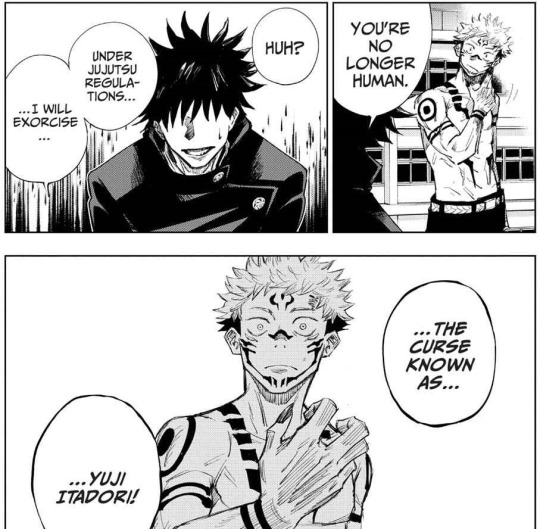
Yuji may be Megumi's target, but remember that Kegare spreads through touch. Sukuna coming into contact with Yuji has made them both unclean. In other words, Sukuna has been informed that in this life, 1,000 years later, where he has yet to do any harm (Those comments about the women, children, and massacre are still sus, but they could've been about the Merger.), he will be attacked by sorcerers no matter what. It's not unreasonable for him to then attack them on sight.
But even when he does that, most of them survive until Shinjuku. During the culling games, Sukuna kills only 2 sorcerers—Ryu and Yorozu. Ryu is given a chance to walk away, but he doesn't. Uro flees and is spared. Yorozu is the sole person Sukuna seeks out to kill and that’s just for his Gojo plans.
And in that month Sukuna has before the showdown with Gojo? Nothing happens. He kills no one and just lounges around. Eating his own corpse is the only cannibalism. He absolutely could have eaten Tsumiki’s body to further crush Megumi’s soul, but he doesn’t.
Then when it comes to the actual showdown, Sukuna kills 3 sorcerers total. It's also very telling that after Sukuna is dead...no one blames him for what happened. They blame Kenjaku, hell even Gojo, but Sukuna isn't mentioned once. Higuruma is convinced that Sukuna was playing around. Kusakabe agrees that Sukuna’s manner of play isn't what they’re super worried about, it's Kenjaku.

The worst thing Sukuna does is Shibuya and that too has nuance to it. The twins aren't killed for fun. Sukuna punishes them for making demands of him. The citizens of Shibuya? Collateral from dealing with Jogo and Mahoraga. (He only really kills Haruta for the sake of it. And let's be real, he deserved that.)
And though the Shibuya civilian deaths are an objectively bad thing Sukuna has done, the fact they are not intentional gives credence to the idea that Sukuna didn't really target them in the past either. This suggests that the "murders" Sukuna did in the Heian were likely retaliation against people challenging him or trying to subjugate him. In other words, self defense.
And if he did wipe out a village, it was probably collateral. But that's kind of the thing. Did Sukuna even kill innocents by accident? The only confirmed kills of the Heian are those of the Subjugation and Military Squads. You know, people who may have attacked him for simply being "unclean".
Who am I kidding he absolutely was attacked for being “unclean”. This is how Angel talks about Sukuna and the incarnated.

She doesn’t care about saving the lives of innocents, all that matters to her are things that she deems evil are purged. Sukuna to Angel is ontologically evil and doesn’t deserve to exist. She targets him more than other incarnated players while ignoring Kenjaku who is responsible for this mess in the first place. She also quite literally did something she deemed wrong and evil so she could follow him into the future and make sure he died. (Move over Gojo Satoru we've got a new minority hunter.)
But it’s not like her attitude is new. Jujutsu Society is notorious for trying to kill things they deem "bad" such as Yuji and Yuta. The striking thing about the wanted executions of these literal children is that the higher ups giving the command make other sorcerers do it for them. Going back to the ideas of Kegare—spilling blood and touching corpses makes one impure so the outcasts are to deal with it. This is the logic driving their decision to coerce Yuta into a binding vow to kill Yuji.

("No matter how many cursed spirits you kill, it's proof of nothing!" <Please take note of how Yuta's good deeds do nothing to earn the higher ups' favor because he's seen as inherently evil.)
Yuta is essentially scapegoated through this manipulation and Yuji initially treats him like an enemy. In the same way characters like Kusakabe blame Gojo for refusing to execute Yuji. Despite the higher ups being responsible for the system functioning this way, the people they’re manipulating bear the brunt of responsibility to other characters.
Who's to say Sukuna isn't also a victim of this scapegoating? His power is comparable to a natural disaster. It would be very easy to blame one on him. After all, the higher ups of the Heian, the Fujiwaras, did exactly that to Uro.

Uro’s situation is much worse than Yuta’s however. She is a military slave. This distinction of military slave is important because unlike domestic slaves, they were allowed to rise through the ranks and be given awards despite their status.
And since Uro is a Sukuna parallel, there is a pretty good chance he was a slave at some point during the Heian.
Slavery in the Heian
A little detail I left out when discussing famine in the Heian. The asymmetrical wealth distribution was so severe during this time that commoners would sell themselves into slavery in hopes of not starving to death.
An example from the Kamakura Era (after the Heian):
"As the article shows, during the three years of the Kangi famine (1229-1232) and several recovery years following, various common people sold themselves, their relatives, and their retainers into slavery in exchange for sustenance. Not only would an amount be given to the seller, but also presumably whoever now owned the sold individual would be responsible for feeding and providing shelter for that individual. In this way, the common populations of Japan created a strategy for survival. There was no certainty that a new owner would fulfill this obligation, but the promise of reprieve from daily struggles was impetus enough for the sale."
Another example from the same era:
"A didactic tale from 1283 tells the story of a small family consisting of a mother and son, who after experiencing severe famine, came to the realization they would soon starve to death. In the hope of saving his mother, the young boy offers to sell himself into bondage, and although the mother disagrees, he goes ahead with the plan."
Yes this is as bad as it sounds, but there is one thing I would like to get out of the way—this slave system did not function anything like the chattel slavery during colonialism. Strangely enough, these slaves had some rights they could fight their owners in court over. They could pay off debts and be set free. They were allowed to be married and have children with those outside of their class. They were not kept in cages or in chains like animals. (Silver linings! /s)
The term used for these slaves was 奴婢 (Nuhi) which roughly translates to “bonded person”. This is more in the contractual sense rather than the physical sense since most were slaves by contract or debt.
This kind of sounds like something binding vows could do, right? Well binding vows share no kanji with Nuhi using 縛り(Shibari) instead. However, Sukuna introduces the concept of binding vows with chains and a handshake.

Sukuna was also born unwanted to a starving mother during a time when starving people sold themselves or their relatives into slavery to survive. This can mean a lot of things for his upbringing and none of them are pleasant.
Here is a summary of what jobs Nuhi did:
"As stated previously, wealthy households frequently obtained slaves and assigned them to various domestic tasks. However, sources further illuminate trafficking of women into the sex trade of Kamakura Japan."
If you noticed, Sukuna's Cursed Technique is perfect for this. He can chop up veggies, butcher fish, till farmland, slash and burn farmland, light fires, and every other non-violent thing a knife and fire can be used for. If he wasn't exploited for exorcising curses, he absolutely would've been exploited for domestic tasks.
And to get to much more depressing line of work Sukuna could've been subjected to as a child, I'd like to discuss why someone as masculine as him would be associated with women's work in the first place.
The Treatment of Women in Ancient Japan
"In Japan prior to the Heian and Kamakura periods, women played prominent roles in religious activities as miko, which was akin to a female medium or female shaman...Since miko functioned as a sacred and integral part in religious communities, issues of impurity did not appear to be an issue. Instead, it was Buddhist ideas that linked the female form to impurity."
With the introduction of Buddhism, women began to be seen as innately impure due to the blood and fluids associated with childbirth and mensuration.
"In the Heian period, Buddhist temples such as such as Enryakuji and Tōdaiji, began barring women from entering the premises due to their defiled nature."
"prominent Buddhist discourse painted women as innately defiled and therefore unable to achieve enlightenment in their own female bodies."
"To be born as an innately defiled female was considered a karmic punishment for past actions."
Though not ostracized as much as outcasts, women were seen as innately unclean in a similar vein to Sukuna. Women were expelled from religious institutions but not the courts, while outcasts were tolerated by religious institutions and barred from the courts. (The courts and temples operated independently of each other, which is why it was possible for noble women to hold power despite being designated as unclean.)
A few months ago I made a joke about this panel:

"Sukuna’s two options were helping Uraume transition or becoming a girl himself."
This is still mostly a joke, but I do think Sukuna identifies more with women than with men. Not that Sukuna is a girl, but that he relates to them and their struggles better. (Keep in mind he does wear a women's yukata and a men's obi at the same time as Yujikuna.)
It's important to note is that this mystery woman here wears the clothes of a Miko or Shrine Maiden/Priestess—the main group of women that was displaced and persecuted because of the new religious doctrine. And like every other group without a proper social safety net, selling themselves into slavery became a survival strategy. They did have other options of course. In the case of Asobi, the Priestess that used to serve the courts, turned to entertainment and sex work after their exclusion.
"Either riding in boats or setting up shop on busy routes to the capital and religious sites, Goodwin argues that these performers were part of independent, possibly female-run organizations, which were not stigmatized until the later part of the Kamakura period. However, as Wakita Haruko has examined, at least some women involved in sexual entertainment were female indentured servants, serving as security on a loan issued by their parents."
In this way, the exact identity of the Miko in Sukuna's path may not matter. She might be a representation of those who accepted their exclusion and did their best to survive on society's terms. If the South choice is meant to represent returning to who Sukuna used to be, then it can also mean the types of struggles Mikos faced are his as well.
However, there was a temple that continued to accept women as followers—the Muroji Temple in Nara. Interestingly enough, this temple contains an inner sanctuary devoted to the founder of Shingon Buddhism, the type of Buddhism Tengen brought over. The mountain this temple is located on is also associated with a dragon spirit. Since there is historical precedent of at least one temple accepting a group of people seen as innately impure, a place like this may have also been a sanctuary for Sukuna.
With the information we have, it's not really possible to know exactly what awful thing happened to Sukuna. The most important takeaway from this is that the suffering he experienced was systemic. He didn't get unlucky with a few ignorant and bad people. This was the direct result of the Heian class system dehumanizing people. In other words, his choices were severely limited.
Sukuna's Other Choice
Going North with Uraume appears to be very similar what he did back in the Heian—taking in an abandoned child and looking after them. What makes this choice slightly different this time around is that the class system that oppressed him no longer exists in the modern era. Yes, he’ll absolutely face discrimination for being deformed, but the complete denial of his humanity at every turn for his appearance is gone. He won’t be treated as untouchable and inherently evil. Legally speaking, he has drastically more rights. Violence won’t be his only option moving up in the world.
I will always loathe that Sukuna had to die to obtain this. And that the “reformed” modern Jujutsu Society refuses to acknowledge the systemic failures of their institution. Kusakabe makes it very clear he still believes the immediate extermination of anything deemed “evil” is a valid way to go about things, even if it means the death of a child…as long as he doesn’t have to do it. (Hence him blaming Gojo for it, just like the higher ups.) After the fight, everyone passes blame around, absolves themselves of any wrongdoing, and decides no one is really at fault.
There were people at fault for this. There are institutions at fault for this. But their failure to confront those things directly is probably why Sukuna rejected Yuji’s offer so viciously. Instead of trying to understand Sukuna on his own terms, Yuji showed him the value of a simple life he was never allowed to have, then told him to die or go back into the cage.

Yuji offered Sukuna pity but no autonomy, which is exactly the way Hinin were treated by the religious institutions of old.
"However, Hosokawa argues that even in veneration of hinin as representations of Manjusri, Buddhist monks continue to discriminate against this outcast group and further perpetuate their low position in society. Hosokawa explains that although activity involved in charitable works towards hinin, Eison cared little about the salvation of hinin because he saw outcasts as divine only within the context of the ritual of assembly. Therefore, all charitable works directed at hinin were merely ceremonial. Hosokawa advocates the view that Eison believed hinin lacked ‘nature,’ meaning they were unable to study or practice Buddhism. Essentially, without nature, they had no ability to escape the cycle of re-birth through the study of Buddhism."
Sukuna even thinks of modern sorcerers like the ones of old. Why would he ever want to return to that?

His goals are simple; eat, play, and pass time until his dies. That’s not really evil now is it? But the people attacking him don’t know that. None of them ever stopped to asked because they assume him existing freely will bring evil.
But what does Sukuna do when he’s given a month-long truce a body he completely controls? He does what every minority group does when they are no longer being actively oppresed—he rests. He doesn’t go around killing or tormenting for fun. With his newfound freedom he secludes himself and lounges.
The fight in Shinjuku is essentially a group of well-meaning people from a corrupt institution beating an outcast that was ostracized by it into submission. Albeit for very good reasons.
Why did this fight change his mind?
If Sukuna is basically reliving past trauma via the Shinjuku fight, why did he decide this group of sorcerers was worth listening to? The simple answer of course is he lost to them. Sukuna believes the strong impose their will and the weak follow suit.

I don’t think that’s quite right. Sukuna used to be weak too. He was a child once. He used to controlled by others stronger than him. By his own logic he should’ve stayed like that, but he trained to get stronger and eventually rebelled.
Since Sukuna is a known liar and hides his feelings under several layers of repression, I’m inclined to believe this statement is also smokescreen. And after reading the Uraume Epilogue I am certain of this. But for now let’s revisit the Shinjuku fight, starting from the battle that made me realize Sukuna is indeed a pathetic sopping wet cat underneath it all—Sukuna vs Gojo.
Sukuna vs Gojo
Something fans picked up on during this fight was how Gojo dogwalked Sukuna when it came to Hand to Hand (H2H) combat. During their fight, Sukuna fails to land a single punch on Gojo’s face. It takes Yuta possessing Gojo’s body and fumbling around in it for Sukuna to finally punch that face. But it’s not just Gojo he sucks at with H2H combat. It’s everyone. Here is a compilation of Sukuna getting hit in the head or face.

This seems to conflict with Sukuna’s ability to learn anything visually. He sees someone do something and he can copy it immediately. This contradiction can be explained by him being Hinin.
Sukuna was considered an untouchable. Educated people were of a higher class and believed unclean things like him were to be avoided at all costs. This means that whatever education Sukuna obtained for himself was always at a distance. Aka watch and copy. And since H2H is mostly taught through body to body contact, Sukuna wasn’t allowed a proper sparing partner outside of the attempts to kill him.
In Part 2, I go over Sukuna’s fraud allegations for his copying of Gojo in particular. This is what lead me to realize that Sukuna spent 6 months plotting to kill a guy he met for 10 seconds. This insane level of pre-planning is also shaped by him being Hinin.
We know for a fact that Sukuna hunts deer/elk and that it’s safe to assume he driven to this because of his Hinin status. If you know anything about hunting, it’s that most of it is playing psychological mind games with creatures that are somehow complete geniuses despite having 2 brain cells. You don’t chase after a deer with a gun, you become obsessed with them. You study every little habit of theirs; when they hunger, what they eat, and where they defecate. Using this information, you set up the bait and wait in hiding for the perfect opportunity to kill them.
This is pretty much what Sukuna does to Gojo. He’s got a hunter’s obsession with him. In Part 4, I explain how this obsession might actually be unhinged courtship, but I don’t lay out why Gojo of all people seemingly means this much to Sukuna. This too can be explained by him being Hinin.
I’ve said it over and over, Gojo and Sukuna are twin flames. They are the strongest, isolated, dehumanized, exploited, self-taught, and really bad at showing affection. Part of this obsession is driven by Sukuna seeing himself in Gojo. He's being ordered around by others weaker than him in the same way Sukuna used to be.

But take note of this “I owe you a debt.” It’s easy to assume he means payback for punching him in the face. However…Gojo did actually do Sukuna a massive favor. He suspended his execution, even if it was primarily to save Yuji.
As I discussed before, Kegare was infectious. You touch something unclean and you become unclean yourself. By laws of Jujutsu Society and by social stigma around Kegare, Sukuna made Yuji equally as impure as himself. And Gojo went screw that, I’m going to look after you. He gave Yuji direct lessons, made sure all his basic needs were met, and treated him like a human. Behind everyone’s backs he hid the final finger, intending to let Yuji live for the duration of his natural life.

To Sukuna, Gojo is someone who would have taken him in and advocated for his humanity under different circumstances. Gojo is someone Sukuna would’ve loved to have as a teacher. And so he copies him. He learns and improves his own sorcery as if Gojo had intentionally taught him.
Through the Shinjuku fight, his experiences within Yuji, and Megumi’s memories, Sukuna gets a taste of what could’ve been. With Megumi in particular, he also gets to see what it’s like to be raised by someone who actually cares. Though not intentional, this is how Gojo teaches Sukuna love. This is why when Sukuna looks at Gojo, he thinks about love.

Sukuna choosing to go with Uraume is him copying Gojo one last time. After seeing that even if you’re isolated, exploited, and miserable, there’s still fulfillment in using your power to make sure someone else doesn’t go through what you did. It may not remove all that pain, but it makes it easier.
And bringing back Kegare’s opposite Hare (晴れ). The kanji used are in the Appare Da (天晴れだ) when Sukuna tells Gojo, “You cleared my skies.” (The Da at the end of this statement means it was pretty heartfelt too.) With this additional context, I think it can be taken to also mean that Gojo made Sukuna feel like he wasn’t impure.

Sukuna vs Yuji
Yuji and Megumi are the ones who ultimately make Sukuna realize that it's worth pursing guardianship regardless of marital status or blood relation. They are the two of Gojo’s students/children that are directly compared to Uraume.

Yuji who is also the same as Sukuna, fills the role of Gojo when he first chooses to look after Megumi. When he prevents Megumi from being sold by his father. Sukuna has seen both versions of this memory.

Since Sukuna is a twin to Wasuke and they are also the same, JJK 265 is Yuji showing Sukuna an entire alternate universe of the normal life he could've lived if he had been seen as human.

And even if he can’t ever be seen as human or live normally, Megumi tells him it’s ok to be improper and cherish someone anyways.

None of these 3 realize how greatly they’ve affected Sukuna. He barely admits to it even in death. But Sukuna had secretly wanted this from the start. The cracks started showing when he first tried to teach Megumi in his special little tsundere shark way.

There's also something to be said about Uraume making it to adulthood in a time where famine was rampant and parents would sell their children into slavery just to eat. Their cursed technique manifested around the age of 6, just like Megumi. The fact they survived means Sukuna was already doing a pretty good job as their guardian.
Other Things this Changes
I'm also looking at Sukuna's fondness towards Jogo in a whole new light. I thought that Jogo wanting nothing of him was the main reason he was favored. But there's more to it that that. It’s that he regards Sukuna’s life as inherently valuable. Jogo believes in a world where Sukuna has the right to exist as he is and how he wants. No one will try to control him or condemn him for something he had no say in.
He also stands out in his devotion to curses of any background. Mahito basically looks like a human, Choso and his brothers are half human, Sukuna is fully human, and Jogo accepts them all no questions asked. He’s willing to fight for people who exist differently than himself.
There's also that added “wanting to be seen as human” element. Jogo’s world is one where Sukuna would finally be seen as human. It’s the same logic that drove Choso to side with the Disaster Curses. He knew how difficult human society would make the lives of his brothers (both of which have 2 faces like conjoined twins), so he chose to fight for a world where that kind of discrimination no longer existed. (Which is why it's really sad he died and no one mourned him properly.)

And yes we can condemn the mass slaughter of humans as the wrong way to go about this. But the core problem is that Jujutsu Society branded them as taboo and in need of extermination or containment. They were driven into a corner and believed violence was the only way out. The only reason Choso was able to change was other sorcerers giving him a chance despite the hurt he caused. Something Sukuna didn't get outside of the offer to be caged.
Am I being too lenient with Sukuna here?
Absolutely. I am extremely biased.
To me at least, the type of "evil" Sukuna is has a lot nuance. It is very significant that someone as strong as him, who could basically do whatever he wanted (theoretically), took one willing servant in a time where slavery was widely practiced. (If you read the linked document, it's kind of up for debate how legal slavery was at the time.) It's also significant that the Heian crimes he was accused of were limited to cannibalism and murder. He's clearly got rules about his evilness and I really like that about him. I wanted to find the logic driving them and I think I've finally struck gold.
This didn't fit anywhere nicely. But consider the following:
"Earthly sins, on the other hand, were those that only affected individuals or forbidden actions, such as rape or cutting living flesh."
Sukuna's CT cuts living flesh. His very CT was considered impure in the Heian. The flames however, are more aligned with purification. It's just a neat little thing that shows Sukuna's duality imo.
He's also really good at archery. And though this is likely because his flame CT is a bow, he probably got good at it to hunt deer/elk on top of temple duties. (Just another way he enjoys corrupting the divine.)
But please remember, the only reason I've done all of this is because of Umineko's...
Without love, it cannot be seen.
#cactus yaps#Read Challenges to Survival: Responses of Outcasts and Commoners in Early Medieval Japan and Umineko now!#Posts that make it obvious I defended Edelgard on Twitter.#I've been running PR for Zelgius and Sephiran Fire Emblem since forever and they do so much worse than Sukuna.#Same type of trauma though. I will always defend minorities going insane from systemic discrimination.#Kind of wild that Sukuna's possession of Megumi can be read as evil adoption now. Thanks Uraume Epilogue.#When Sukuna looks at Gojo he not only thinks of love but raising a child. What did Gege mean by this?#Vaguely Sukugo but it's certainly a footnote compared to the rest of this.#Anyone versed in Japanese history PLEASE fact check me.#ryomen sukuna#jujutsu kaisen#jjk spoilers#jjk meta
338 notes
·
View notes
Text
right now im thinking about Friendsgiving and how funny it's gonna be but mostly im thinking about how the justice league will react upon hearing about the avengers and stuff. specifically the fact that peter doesn't know shit about bucky besides that he's captain america's rude ass boyfriend that is the only person willing to throw him around for enrichment
someone, upon hearing peter mention bucky: oh so what does bucky do?
peter, not knowing they mean as a job or as a hero: uh i think he killed that jfk guy
#everyone has mixed reactions but bruce gets to his concern first#bruce: please tell me you know who jfk is#peter who dropped out of middle school and is absolutely so behind in his history classes: yes.#he is only vaguely aware he was a president#and that he died#he's getting him mixed up with abraham lincoln in his brain too#peter: ok so bucky was alive like a hundred years ago. that makes so much sense he killed that jfk guy (he means abraham lincoln(#(and he's wrong)#erinwantstowrite#ao3#ao3 fanfic#leap of faith ao3#peter parker#bucky barnes#leap of faith catch me if you can#friendsgiving#justice league#spider man and batman#batman crossover
307 notes
·
View notes
Text


30 years went by and I still thought about you
#madness combat#_myart#madness combat oc#oc: zero#2bdamned#vaguely embarrassed but its fine ahaha (walking in circles)#i don't really want to exaggerate and misrepresent the yearning aspect as being like. too overly romantic cus its like...#idk complicated to explain. several layers of feelings going into this and its not straightforwardly “romantic love” its#familiarity. comfort. closeness. where both parties don't expect it to be. where they think it shouldn't be. but they both realise in their#own degrees of perception that they want it but shouldn't have it. but they come back to each other anyway and these feelings brush past#again and again. on top of more complex layers of handler/operative and mortal/Strange Concept Thing and their history with the loop#and hank.
122 notes
·
View notes
Text
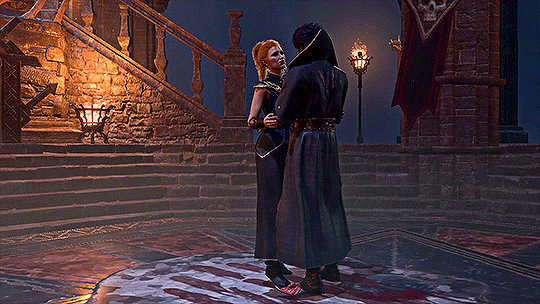
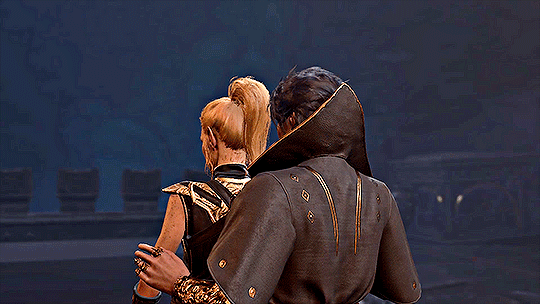
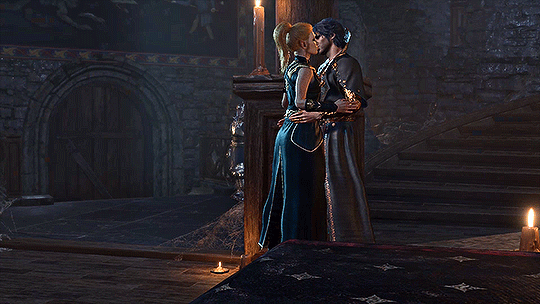
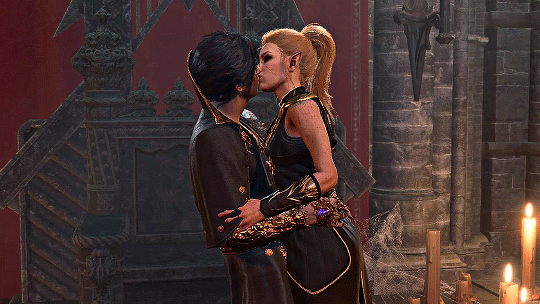
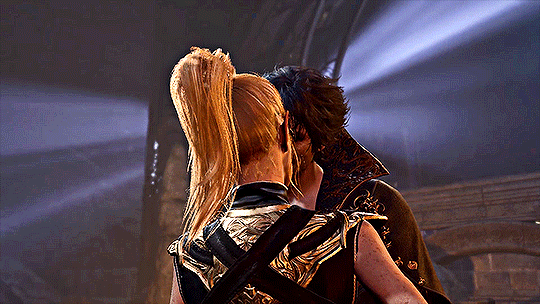
pre-tadpole durgetash + constant PDA around moonrise towers (that drives ketheric utterly insane)
#durgetash#bg3#the dark urge#enver gortash#look we know little enough about their past that i think any interpretation of their physical history is valid#but i like to think it took them years to touch each other for the first time and then once they did they just. would not stop.#we also know little enough about ketheric that i think any interpretation of his reaction is valid#but i think he's a massive hater#this is a man who has spent centuries wishing his daughter could find a way to accept him despite his sins#i think he sees these two utterly despicable people being loved and trusted not just in spite of their ruthlessness but because of it#and he goes “oh look at that. they're holding hands. i want them dead.”#anyway he's in the background yelling “NOT ON THE THRONE”#ketheric's persistent problem is that neither durge nor gortash is capable of seeing the other anywhere near a throne#without getting immensely immensely turned on#this is something that plagues him#they're also weirdly turned on by the absolute's symbol (something about seeing bhaal and bane's symbols intertwined gets them going)#and this strikes ketheric as vaguely heretical (as if he needs more reasons to hate them)#you thought it was orin that broke up the alliance... but actually...
62 notes
·
View notes
Text
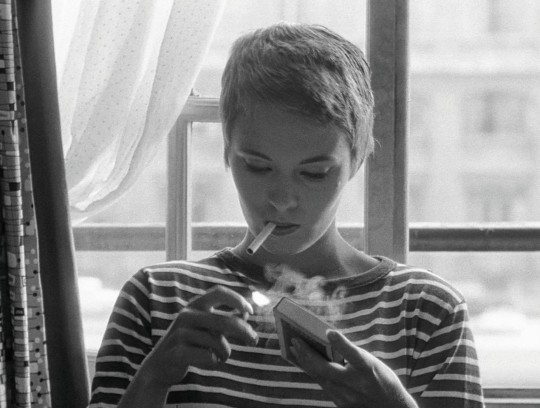

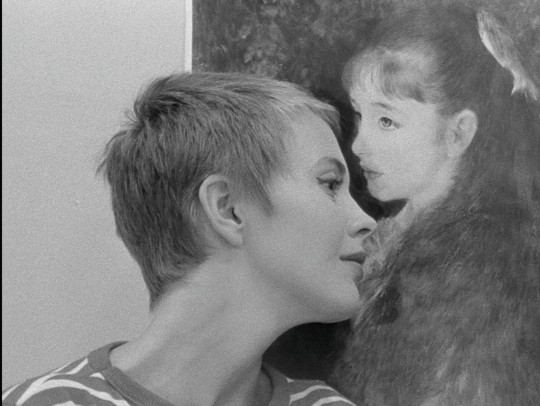






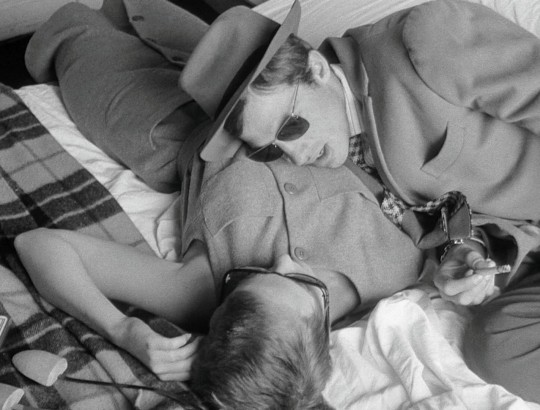
Breathless 1960
#jean paul belmondo#jean seberg#jean luc godard#60s#breathless#art history#nouvelle vague#film#1960s#cinematography#movies#20th century#cinema#people#art#fashion#french cinema#cult movies#aesthetic#raoul coutard#🎬
107 notes
·
View notes
Text
shout out to the fact that both ghost files and puppet history have a higher IMDb score than both buzzfeed unsolved shows
#ace speaks#this was in my drafts and i only vaguely remember writing it#watcher#buzzfeed unsolved#puppet history#ghost files
986 notes
·
View notes
Text
Jason and Rose both refer to each other as their “ex situationship” and the “situation” in question is that one time they got drunk together after finishing up a case and there was a moment where they shared prolonged eye contact and kinda thought that they were about to kiss but then nothing happened and neither of them ever brought it up again
#Jayrose#Mainline canon jayrose is extremely vague about their history together and in my mind’s eye it really is just this#Jason Todd#dc#Kinda yuri of them if you think about it
128 notes
·
View notes
Text
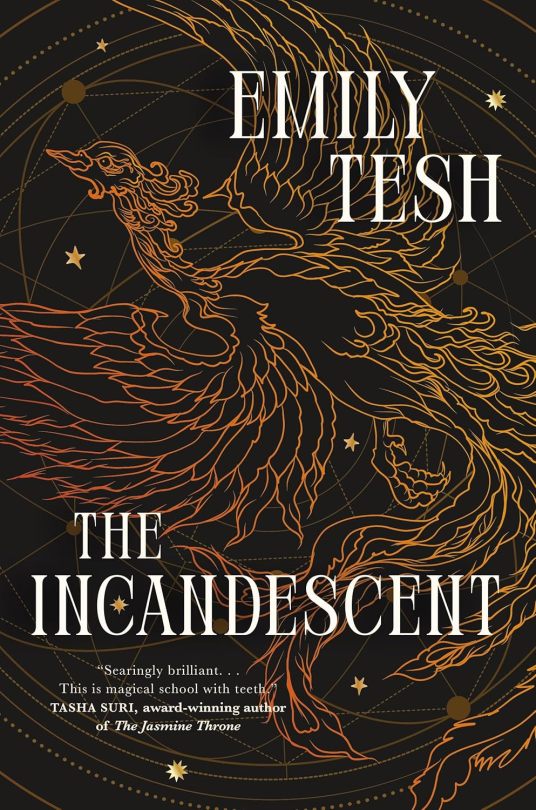
2025 reads / storygraph
The Incandescent
academic fantasy
a powerful magician who’s the director of magic at a magic boarding school, whose job involves keeping up the school’s boundaries against demonic incursions and teaching the four students taking A-level invocation
when something goes wrong and the powerful demon living around the school is is unleashed, her life is thrown out of balance, even after she deals with it
bi MC
#The Incandescent#bisexual books#Oh this was really good!#really interesting take on the magic school subgenre that focuses a lot on the day-to-day responsibilities of trying to be a good teacher#with the added danger of powerful demonic entities#I loved her love of being a teacher/ magic and her students.#I loved the way magic’s interaction with technology was considered#and the concept that demons can inhabit anything given personhood (including how people often call phones or cars or printers ‘you’)#I thoroughly enjoyed the introduction of this through the demon possessing the photocopier#“no demon in history had ever acquired a drivers license”#(vague spoilers) I’m obsessed with how nobody notices about the phoenix bc it’s really obsessed with learning and teaching#we love a butch love interest but it is also kinda like. the marshals are not cops but also they kinda are cops#and then doesn’t really go into that? idk. I feel like that could have been at least explored a little more#considering the other systemic critiques.#direct from my notes: she’s butchhhhhhh but she’s a coppppppppppp :(#that's the only real ? I have about it. good book#there's also a dude love interest for a lot of the middle section but that's more like 'you know what i can have more of a social life#and casual sex if i want; i can be more than just a teacher'#tho also I noted there’s a bit that’s like:#‘straight guy; over 40; not ace but no wife or ex wife; not even an old girlfriend; there must be something seriously wrong with him’#(this is also in the context of him being a rich wanker; not soley on the fact that he’s unpartnered)#imo bringing up the ace thing made it weird. like i wouldn’t have considered that line to be aphobic but now it does a little sdjhgsfl#(anyway definitely a nonissue. I’m just. sometimes things need a reword not a shoved in *except for asexuals lmao)#(I *think* the author might be aspec too? so really more of just an awkward thing lol)
41 notes
·
View notes
Text
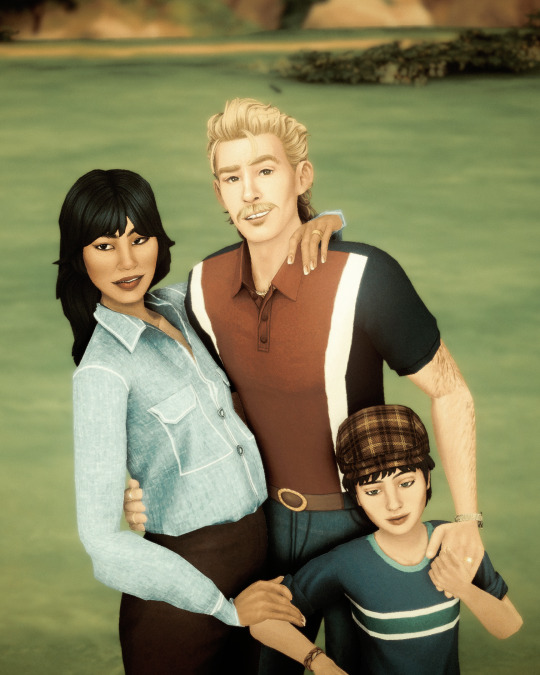
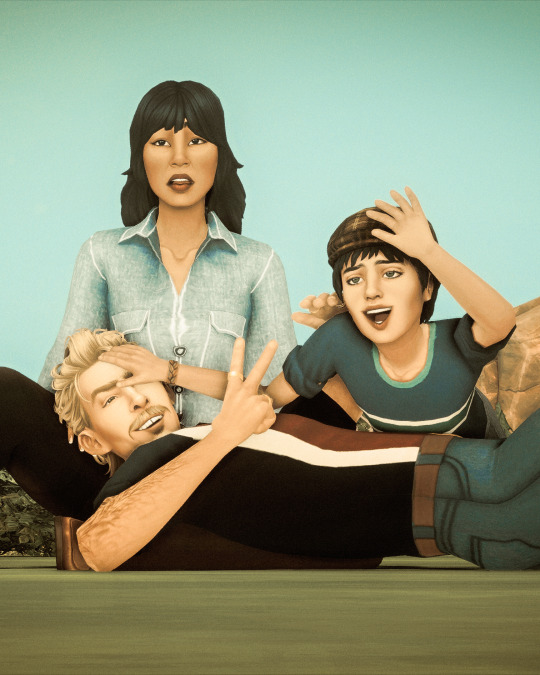
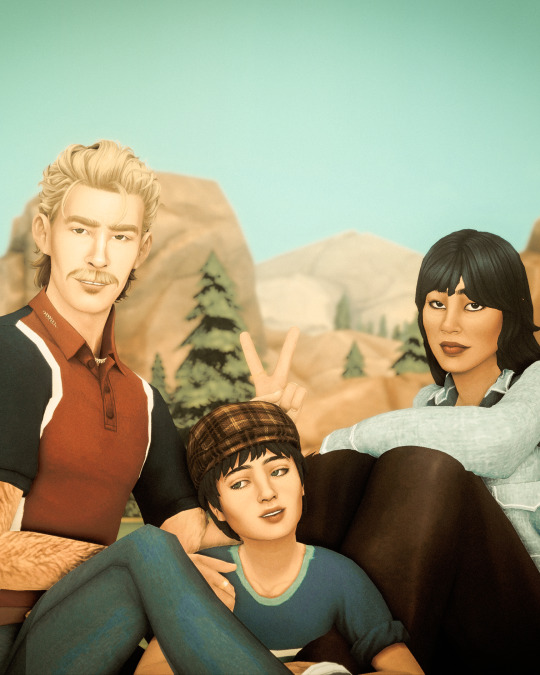
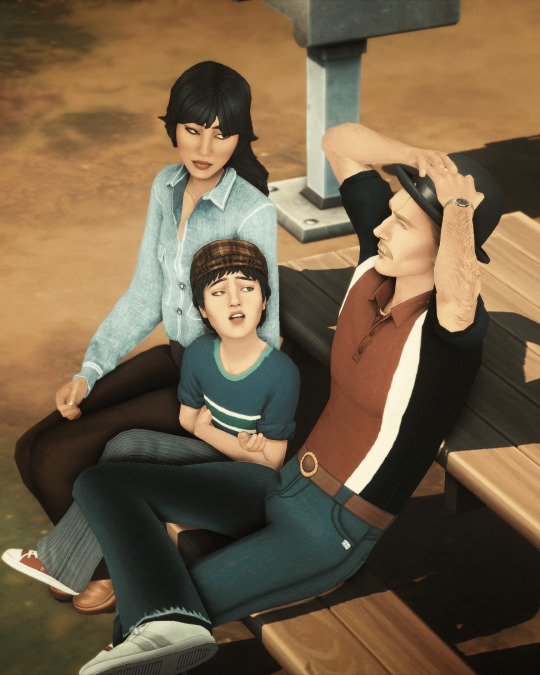
(04.07) ❝ My dad professed to be a traveling salesman—[What, he wasn’t?] I mean, he didn’t know jack shit about vacuums or whatever the fuck. I don’t know. [But, he wasn’t around a lot, it sounds like?] Gone for weeks at a time. Just me and my mom. I had books to read, and I got into music early—[From her?] No. My dad’d blow into town and bring pity gifts. Not kid-appropriate shit, now that I think about it. Heavy, gritty stories. A guitar I was too little to use. Flip lighter. ❞
The man known to his family and hometown as Barry Ledford turned out to be known everywhere else as Bartlett, Bon Chrétien, or Poire Williams. Renzo also learned on the night of this revelation that, at least to the women of the Body Shop, he responded to Perry as well. That one was especially baffling until he explained: 'No, no, no! Not like Perry Mason, goddamn. The fruit. Pear. Pear-ee. Bartlett pear. Didn’t I tell you before? Mamaw called me Bartlett. Said Finbar was "a dumbass’s name." Now, mind you, I am a junior—’
The friends and acquaintances who gave him his ridiculous nicknames were colorful, outrageous characters themselves. Soon after the chance reunion, Renzo started encountering them like unwanted pests at his favorite hot spots. They approached with wild enthusiasm. They dropped details the size of encyclopedias about his father’s mysterious life. They were shocked Renzo didn’t know he was a frequent WeHo tourist, that he studied creative writing at Stanford, that he published a poignant story about his wife's miscarriages while there, that he dropped out to explore psychedelics in San Francisco instead, that he used to scare the daylights out of pedestrians all over the western half of the country in a dubiously acquired Ford Thunderbird, that he flipped it in the desert off Route 66 but managed to hitchhike back to Petunia in time for his son’s birth—or, almost and with a bouquet of wilted roadside wildflowers, at least. Each time someone told a story, Renzo felt himself wrenched in polar directions: simmering resentment and disbelief on one side but, on the other, amusement joined by a twisted sort of pride. ‘I guess you must look like your mother,’ one such pest opined after a night of partying together. She studied him for a long moment, so long that Renzo began to itch with impatient agitation. Then, she concluded with a ugly grin, ‘But this apple did not fall far at all from that tree!’
#shoutout to disco pals & esp H for the inspo lmao#i am once again weaving History into things#i'm so glad i kept him so vague until i had Ideas#maite's so pretty ...#these are NOT canon photos#reyes.outtake.4
44 notes
·
View notes